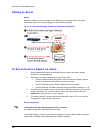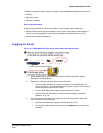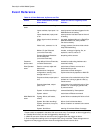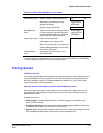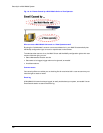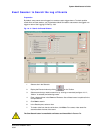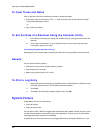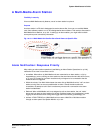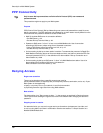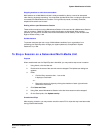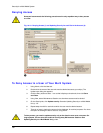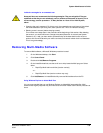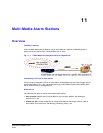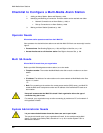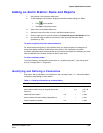
Security for a Multi-Media System
196
PPP Connectivity
Tip
Only in some dial-up connections are Point-to-Point Protocol (PPP) user names and
passwords used.
This procedure might not apply to your Multi system.
Purpose
PPP (Point-to-Point Protocol) Dial-up Networking user names and passwords are used for some
dial-up connections. The PPP username and password for an alarm station usually differs from the
PPP username and password needed to access a RAS server.
• Multi SA includes RAS server in connection definition.
- See
RAS Server, p. 44.
- See also
Dial-up Technical Note, p. 33.
• Operator to RAS server “in front ” of one or more Multi-Media units. Use of connection
accessing a RAS server, before using View is illustrated in sections:
-
Using a RAS Server before Connecting to a Unit, on p. 47.
- See also
Dial-up Technical Note, p. 33.
• Unit connecting by dial-up to alarm station’s modem. To automate the process of a Rapid Eye
Multi-Media unit sending alarms to View over telephone lines, use Admin to enter the PPP user
name and password for a PC, in the definition of an alarm station.
Dial-up Connection to an
Alarm Station on p. 208.
• Unit connecting by dial-up to RAS server “in front” of a Multi-Media alarm station. Use of an
alarm callback that includes a RAS server is illustrated in:
RAS Connection to an Alarm Station, p. 216.
Denying Access
Rogue user scenarios
There may be situations when a specific account user must be
quickly denied access to a Rapid Eye site (for disciplinary reasons, termination, and so on). If your
Multi system is accessed using
a laptop, or by many PCs on your network, it could be inconvenient
to physically prevent a rogue user from using Multi software.
Best solution
The best solution is to “Deny access to sites…” in the account, as explained in Denying Access.
This is quicker than deleting the rogue account and more effective than changing the account’s
password.
Stopping a user in session
On networked units, you can end a rogue user's use of sessions (maintenance, live video, and
so on) by using Admin and View in combination. See the next section,
To Stop a Session on a
Networked Multi-Media Unit
.



